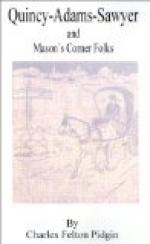“And when do you think your health will allow you to resume your position in the office?” inquired the Hon. Nathaniel.
“That is very uncertain,” replied Quincy.
“If you do not intend to come back at all,” continued the father, “that would simplify matters. I could then make room for a Harvard graduate to study with us.”
Quincy reflected. He had been taught by his father not to give a positive answer to any question on the spur of the moment, if more time could be taken, as well as not, for consideration. So, after a few moments of thought, Quincy said, “I will write you in the course of ten days or a fortnight, and give you a positive answer.”
“That will be entirely satisfactory,” answered his father. “As you are going out, will you kindly tell Mr. Crowninshield that I wish to consult with him?”
Quincy knew that the interview had expired by limitation. He went home, but found that his mother and sisters were out riding.
“They will return in time for dinner,” said Delia, the parlor maid.
Quincy went into the parlor and opened the grand piano. He sat down before it, touched a few of the keys casually, then sang, with great expression, the song by J.R. Thomas entitled “Pleasant Memories.” He next wandered into the library, and took down and glanced at several books that he had devoured with avidity when a boy of sixteen. Then he went upstairs to his own room, which he had occupied since he was eight years old. It looked familiar, everything was in its accustomed place; still, the room did not look homelike. Strange as it may seem, Quincy had been happier in the large west chamber, with its old-fashioned bureau and carpet and bed, than he had ever been in this handsomely furnished apartment in the Beacon Street mansion. There was no wide fireplace here, with ruddy embers, into whose burning face he could look and weave fanciful dreams of the fortune and happiness to be his in the future.
He spent a pleasant evening with the family. His father was present, but passed the time in reading the newspapers and a legal brief that he wished to more closely examine. His mother was engrossed in a new novel, but no approving smile or sympathetic tear demonstrated any particular interest in the fates of the struggling hero or suffering heroine.
Florence sat at the piano, and, in response to Quincy’s request that she would give him some music, played over some chromatic scales and arpeggios. He declared that they reminded him of grand opera, which remark sent Maude into a fit of satirical laughter, and Florence up to her room in a pout.
Then Maude fell to asking Quincy questions about himself, to which he returned evasive and untruthful answers, until she was, as she said, completely disgusted. Then she dropped her head upon his shoulder, and with the arms of the brother whom she dearly loved clasped around her, she went to sleep. He looked at the sweet girlish face and thought, not of her, but of Alice.




